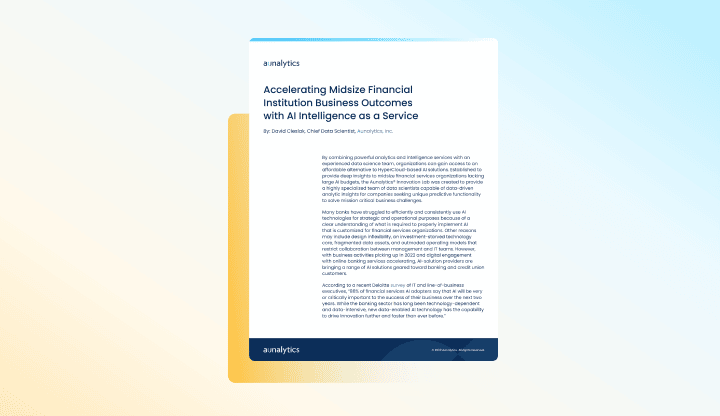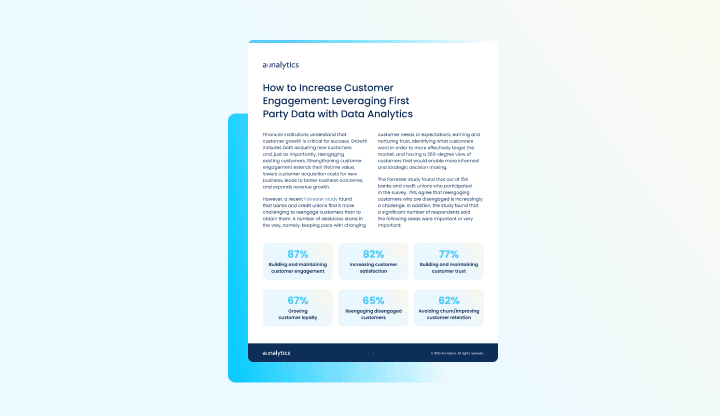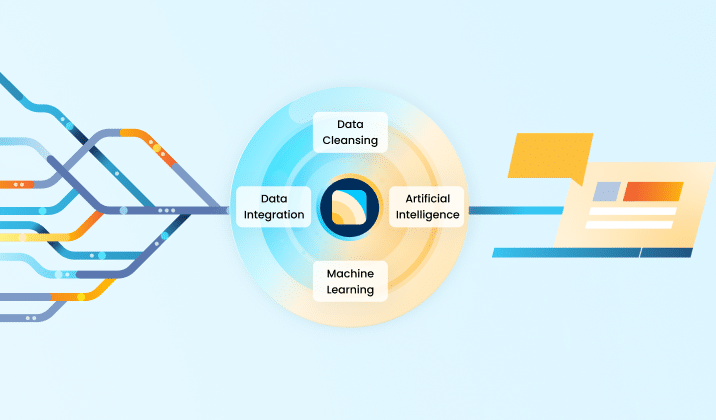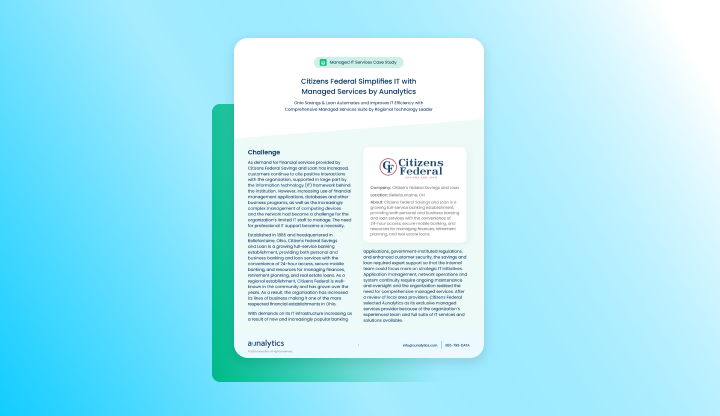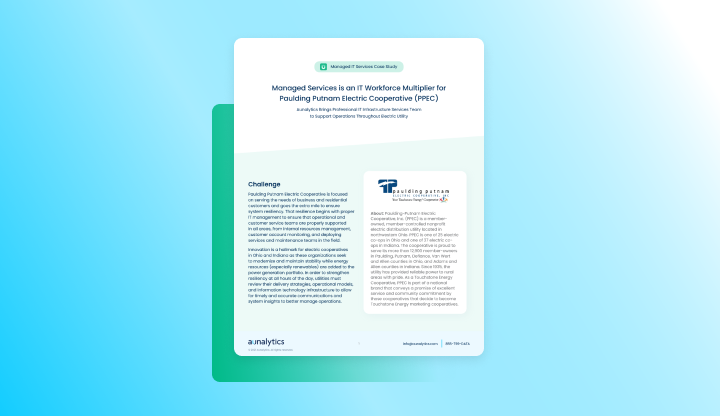Accelerating Midsize Financial Institution Business Outcomes with AI Intelligence as a Service
Accelerating Midsize Financial Institution Business Outcomes with AI Intelligence as a Service
Many financial institutions have struggled to efficiently and consistently use AI technologies for strategic and operational purposes. To meet this need, the Aunalytics® Innovation Lab was established to provide deep insights to midsize financial services organizations lacking large AI budgets. This combination of powerful analytics and intelligence services with an experienced data science team allows organizations to gain access to an affordable alternative to HyperCloud-based AI solutions.
Aunalytics Introduces Enterprise Analytics as a Managed Service for Enterprises in Secondary and Tertiary Markets
Leading Data Management and Analytics Provider Couples Powerful Data Management and AI-driven Analytics Technology with a Team of Data Scientists and Engineers so Enterprise Organizations Can Remain Competitive and Thrive in Today’s Data-driven Environment
South Bend, IN (November 16, 2022) - Aunalytics, a leading data management and analytics company delivering Insights-as-a-Service for mid-market businesses, announced today it has initiated Enterprise Analytics, a managed service comprised of experts in data analytics, data engineering, artificial intelligence (AI) and machine learning. The new solution couples the tools and technology required to help enterprises achieve their analytics objectives for business success.
Organizations need an enterprise data strategy and AI-powered analytics intelligence to better understand their customers, provide insights for new products and services, and improve operational excellence. Yet enterprises in secondary and tertiary markets are often challenged with hiring and retaining the technical talent needed to develop and execute complex analytics solutions.
Analytics typically poses difficulties in three areas:
- Data – Data is often siloed, dirty, and difficult to join; data points that are needed don’t exist; and it’s a challenge to share insights rapidly across the enterprise.
- Technology – Legacy data warehouses were not set up for the volume, variety, and velocity of today’s data; data is based on systems of record, not for analysis; and automation and integration capabilities are lacking, as are machine learning and AI capabilities.
- People – Hiring and retaining needed technical talent is time intensive; data science expertise and AI resources are difficult to find; and IT teams can find it overwhelming with where to start.
Aunalytics offers an all-in-one platform that includes an advanced cloud infrastructure, top level security and compliance with 24/7/365 monitoring, comprehensive data management and analytics, and AI- and machine learning-powered data analytics. The company’s pool of data scientists and engineers work alongside its customers’ data, IT, and business intelligence teams in a partnership model that facilitates their business outcomes.
Enterprise Analytics delivers distinct advantages that help companies achieve return on their investment (ROI):
- Managed analytics services overcome secondary and tertiary market difficulty in hiring and retaining the talent needed for an analytics program.
- Powerful industry-specific analytics with predictive capabilities built by Aunalytics’ data scientists enables customers to competitively position for the future.
- Transactional data mining transforms data into an asset for growth.
- Enterprise Analytics is an end-to-end solution, meaning customers don’t need to piece together technologies; Aunalytics brings the talent and technology to do it all, from data integration to data-driven insights.
- An approach that prioritizes stronger vs. weaker use cases maximizes both short-term and long-term ROI; within the first 90 days, Aunalytics will estimate potential ROI for the highest priority use cases. This customer intelligence model has been shown to generate 390% ROI in the first year.
“We understand the challenges that enterprises in secondary and tertiary markets face when striving for digital transformation, which is a requirement for all organizations who want to remain competitive and thrive in today’s business environment,” said Kyle Davis, Vice President of Managed Analytics, Aunalytics. “Organizations partner with Aunalytics for both the technology and expertise they need to realize value from their data. Analytics is a program, not a project. We extend their in-house teams so they have the consistent long-term expertise it takes to achieve ROI and business outcomes from data analytics.”
Tweet this: .@Aunalytics Introduces Enterprise Analytics as a Managed Service for Enterprises in Secondary and Tertiary Markets #Dataplatform #DataAnalytics #Dataintegration #Dataaccuracy #AdvancedAnalytics #ArtificialIntelligence #AI #Masterdatamanagement #MDM #DataScientist #MachineLearning #ML #DigitalTransformation
About Aunalytics
Aunalytics is a leading data management and analytics company delivering Insights-as-a-Service for mid-sized businesses and enterprises. Selected for the prestigious Inc. 5000 list for two consecutive years as one of the nation’s fastest growing companies, Aunalytics offers managed IT services and managed analytics services, private cloud services, and a private cloud-native data platform for data management and analytics. Aunalytics’ data management platform is built for universal data access, advanced analytics and AI – unifying distributed data silos into a single source of truth for highly accurate, actionable business information. Its DaybreakTM industry intelligent data mart combined with the power of the Aunalytics data platform provides industry-specific data models with built-in queries and AI for accurate mission-critical insights. To solve the talent gap that so many mid-sized businesses and enterprises located in secondary markets face, Aunalytics’ side-by-side digital transformation model provides the technical talent needed for data management and analytics success in addition to its innovative technologies and tools. To learn more contact us at +1 855-799-DATA or visit Aunalytics at https://www.aunalytics.com or on Twitter and LinkedIn.
PR Contact
Denise Nelson
The Ventana Group for Aunalytics
(925) 858-5198
dnelson@theventanagroup.com
How to Increase Customer Engagement: Leveraging First Party Data with Data Analytics
How to Increase Customer Engagement: Leveraging First Party Data with Data Analytics
Financial institutions understand that customer growth is critical for success—both acquiring new customers and, just as importantly, reengaging existing customers. Strengthening customer engagement extends their lifetime value, lowers customer acquisition costs for new business, leads to better business outcomes, and expands revenue growth. Using the data that you already have in-house, coupled with data analytics and predictive modeling, will drive smarter marketing campaigns that increase customer engagement.
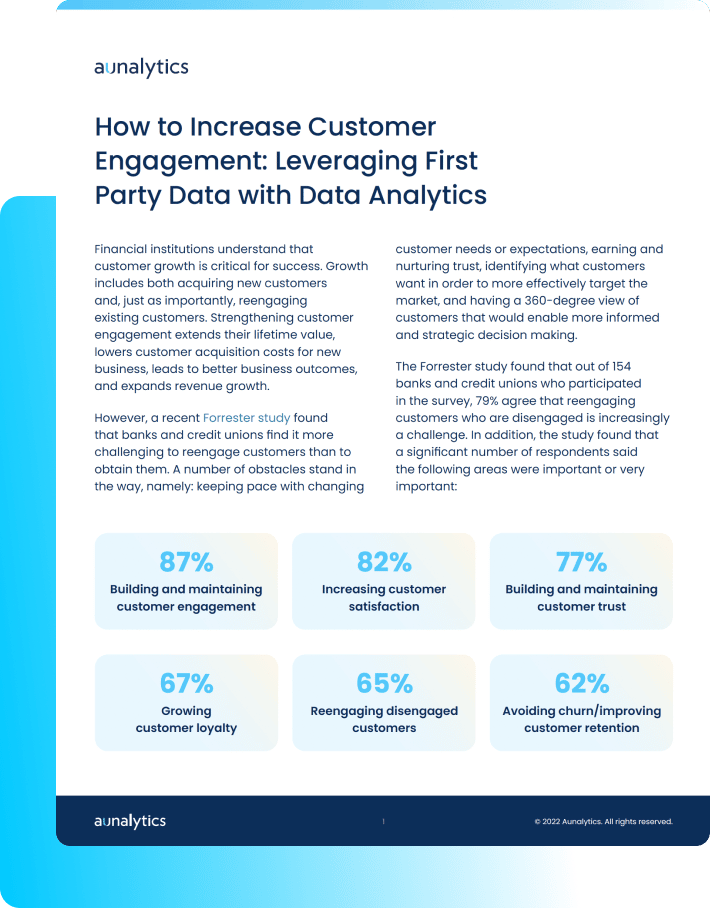
Fill out the form below to receive a link to the article.
Aunalytics is a data platform company. We deliver insights as a service to answer your most important IT and business questions.
How to Increase Customer Engagement: Leveraging First Party Data with Data Analytics
How to Increase Customer Engagement: Leveraging First Party Data with Data Analytics
Financial institutions understand that customer growth is critical for success—both acquiring new customers and, just as importantly, reengaging existing customers. Strengthening customer engagement extends their lifetime value, lowers customer acquisition costs for new business, leads to better business outcomes, and expands revenue growth. Using the data that you already have in-house, coupled with data analytics and predictive modeling, will drive smarter marketing campaigns that increase customer engagement.
Does Your Mid-Market Firm Have the Right Talent to Maximize Its Data Tech Investments?
Does Your Mid-Market Firm Have the Right Talent to Maximize Its Data Tech Investments?
Investing in digital transformation technologies can be a waste of money if your company forgets one important point. That point is, no matter how cutting edge the tech or tool may be, people are needed with specific technical expertise in order to derive true business value from these investments.
Unlike large enterprises, mid-market companies often try to find this expertise in their IT manager, hoping a jack-of-all-trades approach will take care of it. This is an unfortunate mistake, since it would require the IT manager to have unusual command over a long laundry list of duties, from data integration, ingestion, and preparation to data security, regulatory compliance, data science, and building pipelines of data ready for executive reporting from multiple cloud and on-premises environments. This is not just a tall order for a mid-market IT manager to pull off, but likely an impossible one.


To read more, please fill out the form below:
Does Your Mid-Market Firm Have the Right Talent to Maximize Its Data Tech Investments?
Does Your Mid-Market Firm Have the Right Talent to Maximize Its Data Tech Investments?
Investing in digital transformation technologies can be a waste of money if your company forgets one important point. That point is, no matter how cutting edge the tech or tool may be, people are needed with specific technical expertise in order to derive true business value from these investments.
Unlike large enterprises, mid-market companies often try to find this expertise in their IT manager, hoping a jack-of-all-trades approach will take care of it. This is an unfortunate mistake, since it would require the IT manager to have unusual command over a long laundry list of duties, from data integration, ingestion, and preparation to data security, regulatory compliance, data science, and building pipelines of data ready for executive reporting from multiple cloud and on-premises environments. This is not just a tall order for a mid-market IT manager to pull off, but likely an impossible one.

At the same time, it’s unreasonable to expect that most mid-market firms can hire an entire division of data experts—who each need to be highly compensated—in order to achieve the organization’s digital transformation goals. Even if a mid-market player could afford it—which is unlikely to make economic sense—these talent resources are scarce and in high demand.
If you’re still wondering whether your IT manager’s skill set, leveraged by your in-house IT technicians, can properly run the gamut required to achieve value from your data technology investments, consider that the person in this position would need the ability to master a wide range of skill sets, from cloud architecture, database engineering, and master data management to data quality, data profiling, and data cleansing. More specifically, your IT manager would need to take on five additional specialized roles for technical talent that are critical for achieving value from data technology investments.
These roles are:
Chief Data Officer/Chief Digital Officer
A chief data officer (CDO) is focused on—you got it—data. Most mid-market companies understandably don’t have a CDO, which means they don’t have anyone who assures regulatory compliance for data handling while managing and exploiting information assets, reducing uncertainty and risk, and applying data and analytics to drive cost optimization and revenue objectives. For IT managers to fulfill a CDO role, they’d have to be equipped to bring a global perspective to company data, help their organization gain competitive advantage over peers, and manage data and analytics. They’d also need the ability to secure data, transform it into valuable business information, lead digital transformation initiatives, and use data for growth and operational efficiency.
Cloud Engineer
The primary job of a cloud engineer is to keep cloud data centers operational and secure for ecosystem users to be able to store and access their data. Cloud engineers are experts in minimizing downtime, managing access to data, managing compute and storage, and setting up cloud architectures for clients, tenants, and containers. They also monitor data center hardware, servers, networks, and communications systems for operational continuity and efficiency.
Data Security Expert
Mid-market firms also need a way to channel the talents of a data security expert, CISO, or cybersecurity director to ensure cyber-security for the company’s data. Data security experts must keep current on emerging threats while executing data security strategies to fend off and remediate attacks. This involves a wide range of duties, including working closely with the IT team to run the company’s Security Operations Center (SOC), constantly monitoring servers, networks, and workstations for security threats, and staying up to date on the changing compliance laws and regulations for the business, to name a few. While larger IT teams have bandwidth to fill cybersecurity needs inhouse, many midmarket IT teams do not have capacity for the 24/7/365 monitoring and security edits needed to thwart attacks, let alone bandwidth for executing on mitigation and response strategies needed to overcome them.
Data Engineer
A data engineer’s primary job is to prepare data for analysis or operational uses, which involves integrating data from different sources, as well as implementing and executing data profiling, cleansing, transforming, and normalizing data. Data engineers also work with data in motion and use master data management to ensure data consistency across an organization. Finally, a data engineer is your go-to technical resource for database construction and management, helping to optimize the company’s data ecosystem.
Data Scientist
It should be clear now why a mid-market IT manager should not be expected to take on these additional professional roles, but in case there’s any doubt, keep in mind that a data scientist is also needed. Data scientists develop algorithms and leverage deep learning models to analyze data with artificial intelligence and machine learning. The data scientist creates the “brain” of the data analytics solution to position it for providing accurate answers based on business information. Data scientists also mine data to find opportunities for business growth and efficiency. Ideally, the data scientist uses tools that enable non-technical business users to query data sets without having to write SQL or other code.
Master of One
If you’ve correctly determined that your mid-market IT department does not have enough time to absorb these data roles into their regular duties of keeping your company systems stable and responding to help desk tickets from your team, don’t despair. There’s a viable solution for mid-market businesses with this dilemma: they can partner with data experts who provide a side-by-side model coupling technology with talent. This allows the mid-market to efficiently compete, leveraging the necessary skillsets to achieve digital transformation success.
What does successful mid-market digital transformation require? The key is to have a cloud-based data center, a cloud native data management platform, and cloud native analytics, thus shifting the burden of procuring and maintaining the infrastructure to a third-party vendor in the data industry. Instead of attempting to reinvent the wheel in house, mid-market players should ensure they’re partnered with the right infrastructure to maximize the data-center capabilities, and data storage and management, for effective digital transformation.
Mid-market firms can gain the benefits of working with a wide range of experts including cloud engineers, data engineers, security experts, data scientists, and other highly skilled technical resources if they establish a partnership with a data platform company. By opting for this type of side-by-side expert help, the mid-market can achieve true business value—without needing to hire an entire data team.
Bridging the Mid-Market Talent Gap for Digital Transformation
Bridging the Mid-Market Talent Gap for Digital Transformation
To achieve business value from data technology investments, mid-market companies need the right technical expertise and talent. Yet many mid-market firms push this onto their IT manager, assuming that since it is technology related, IT has it. This is a mistake because most IT departments do not have time for data analytics. They are busy full time keeping company systems stable and secure, and providing support to your team members. This by necessity results in IT deprioritizing data queries over crucial cybersecurity attack prevention. Business analysts and executives get frustrated waiting for data query results, and the data is stale or the business opportunity has passed by the time query results are in.

But even if your IT team had time for it, it still is a mistake to rely on traditional technology administrators for data analytics success. This is unless your IT department has expertise across a wide range of skill sets, from cloud architecture, database engineering, master data management, data quality, data profiling, and data cleansing. What’s more, your IT manager would need to have command over data integration, data ingestion, data preparation, data security, regulatory compliance, data science, and building pipelines of data ready for executive reporting from multiple cloud and on premises environments.
When you read this laundry list of needs, it becomes clear that most mid-market IT departments lack the specialized experts needed to derive business value from their data. Unlike larger enterprises that have the resources to hire skilled staff for these roles, the mid midsize organization requires another option that provides access to the right tools, resources, and support. One that integrates, enriches and is trained in utilizing AI, machine learning, and predictive analytics to achieve more useful results.

To read more, please fill out the form below:
Learn More
Bridging the Mid-Market Talent Gap for Digital Transformation
Bridging the Mid-Market Talent Gap for Digital Transformation
To achieve business value from data technology investments, mid-market companies need the right technical expertise and talent. Yet many mid-market firms push this onto their IT manager, assuming that since it is technology related, IT has it. This is a mistake because most IT departments do not have time for data analytics. They are busy full time keeping company systems stable and secure, and providing support to your team members. This by necessity results in IT deprioritizing data queries over crucial cybersecurity attack prevention. Business analysts and executives get frustrated waiting for data query results, and the data is stale or the business opportunity has passed by the time query results are in.

But even if your IT team had time for it, it still is a mistake to rely on traditional technology administrators for data analytics success. This is unless your IT department has expertise across a wide range of skill sets, from cloud architecture, database engineering, master data management, data quality, data profiling, and data cleansing. What’s more, your IT manager would need to have command over data integration, data ingestion, data preparation, data security, regulatory compliance, data science, and building pipelines of data ready for executive reporting from multiple cloud and on premises environments.
When you read this laundry list of needs, it becomes clear that most mid-market IT departments lack the specialized experts needed to derive business value from their data. Unlike larger enterprises that have the resources to hire skilled staff for these roles, the midsize organization requires another option that provides access to the right tools, resources, and support. One that integrates, enriches and is trained in utilizing AI, machine learning, and predictive analytics to achieve more useful results.
Achieving Digital Transformation
Digital transformation has been defined by some as the integration of digital technology into all areas of a business, fundamentally changing how employees operate and deliver value to customers. Some of the challenges midsize businesses have with building an internal team to initiate this concept are employee pushback, lack of expertise to lead digitization initiatives, improper organizational structure, the absence of a digitization strategy and limited budget. As an alternative to building an internal operation, a more efficient way for mid-market businesses is to leverage the skillsets of experts by partnering with a consolidated group of experts, leveraging a side-by-side model that couples technology with talent. Look for solution providers that offer the following:

- Powerful cloud data centers paired with engineers skilled in architecting cloud-based applications and processes that better serve critical business requirements. These data centers are optimized for true multi-tenancy, built on seamlessly integrated hardware and software, offer business-driven configurability, world-class security and performant systems.
- Active Monitoring and Thoroughly Integrated Security. Monitoring and security should be pervasive across system infrastructure to defend against cyberattacks and provide remediation when required. Business customers will also expect full-time monitoring and on-demand help desk to address unexpected events. The data management platform underpinning applications should be monitored by experienced data engineers with success in building data warehouses, data lakes, and data pipes. They should also be able to integrate, cleanse, and transform data into decision-ready and analytics-ready business information.
- High ROI Business Insights that Drive Results. Data analytics investments need to provide real business value by giving actionable insights and finding opportunities within your data. With this in mind, data analytics should include access to data scientists and business analysts versed in your industry. These experts should be equipped to design AI-powered algorithms that answer the most pressing questions based on real-world business challenges.
Mid-Market Data Transformation for Enterprise-Class Results
Ensuring the right mix of hardware, software and resulting services are available to maximize the data center capabilities—and their ability to manage and protect data—is crucial to effective mid-market digital transformation. To compete and drive value, the cloud data center provider must deliver at all levels, with customizable business intelligence solutions powered by an effective data management platform that is secure and compliant. Successful mid-market digital transformation thus requires a shift of responsibilities for infrastructure procurement and maintenance to a third-party provider backed by experienced staff and best-in-class infrastructure.
When implementing a digital transformation project, your company gains from the many benefits this brings, such as a higher return on your IT investment, increased employee and customer experience, and greater business agility. This is further enhanced by leveraging experienced cloud engineers, data engineers, security experts, data scientists, and other highly skilled technical resources—achieving true business value from the investment. And by partnering with experts, your company’s time, resources, and innovation can be focused on its core competencies.
